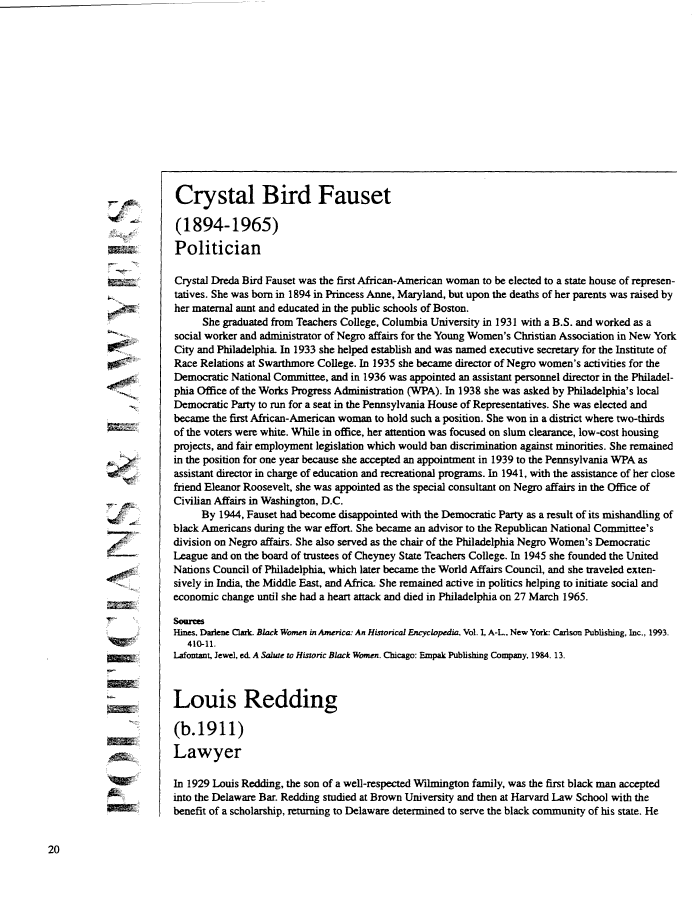 |
||||
|
TASK FORCE TO STUDY THE HISTORY AND LEGACY OF SLAVERY IN MARYLAND (Final Report) 1999/12/31 MdHR 991422 MdHR 991422, Image No: 380 Print image (85K) |
 |
||||
|
TASK FORCE TO STUDY THE HISTORY AND LEGACY OF SLAVERY IN MARYLAND (Final Report) 1999/12/31 MdHR 991422 MdHR 991422, Image No: 380 Print image (85K) |
| Crystal Bird Fauset (1894-1965) Politician Crystal Dreda Bird Fauset was the first African-American woman to be elected to a state house of representatives. She was bom in 1894 in Princess Anne, Maryland, but upon the deaths of her parents was raised by her maternal aunt and educated in the public schools of Boston. She graduated from Teachers College, Columbia University in 1931 with a B.S. and worked as a social worker and administrator of Negro affairs for the Young Women's Christian Association in New York City and Philadelphia. In 1933 she helped establish and was named executive secretary for the Institute of Race Relations at Swarthmore College. In 1935 she became director of Negro women's activities for the Democratic National Committee, and in 1936 was appointed an assistant personnel director in the Philadelphia Office of the Works Progress Administration (WPA). In 1938 she was asked by Philadelphia's local Democratic Party to run for a seat in the Pennsylvania House of Representatives. She was elected and became the first African-American woman to hold such a position. She won in a district where two-thirds of the voters were white. While in office, her attention was focused on slum clearance, low-cost housing projects, and fair employment legislation which would ban discrimination against minorities. She remained in the position for one year because she accepted an appointment in 1939 to the Pennsylvania WPA as assistant director in charge of education and recreational programs. In 1941, with the assistance of her close friend Eleanor Roosevelt, she was appointed as the special consultant on Negro affairs in the Office of Civilian Affairs in Washington, D.C. By 1944, Fauset had become disappointed with the Democratic Party as a result of its mishandling of black Americans during the war effort. She became an advisor to the Republican National Committee's division on Negro affairs. She also served as the chair of the Philadelphia Negro Women's Democratic League and on the board of trustees of Cheyney State Teachers College. In 1945 she founded the United Nations Council of Philadelphia, which later became the World Affairs Council, and she traveled extensively in India, the Middle East, and Africa. She remained active in politics helping to initiate social and economic change until she had a heart attack and died in Philadelphia on 27 March 1965. Sources Hines, Dariene Clark. Black Women in America: An Historical Encyclopedia, Vol. I, A-L., New York: Carlson Publishing, Inc., 1993. 410-11. Lafontant, Jewel, ed. A Salute to Historic Black Women. Chicago: Empak Publishing Company, 1984. 13. Louis Redding (b.1911) Lawyer In 1929 Louis Redding, the son of a well-respected Wilmington family, was the first black man accepted into the Delaware Bar. Redding studied at Brown University and then at Harvard Law School with the benefit of a scholarship, returning to Delaware determined to serve the black community of his state. He 20 |